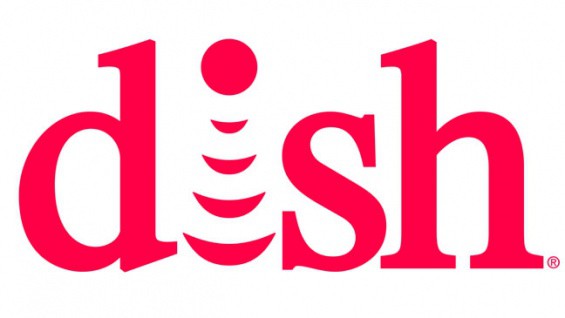 Dish Network Corporation is in the final stages of talks to acquire assets that include valuable wireless spectrum and Sprint’s Boost Mobile brand for an estimated $6 billion, according to a report quoting anonymous sources published by Bloomberg News, clearing the way for the Department of Justice to approve the merger of T-Mobile and Sprint.
Dish Network Corporation is in the final stages of talks to acquire assets that include valuable wireless spectrum and Sprint’s Boost Mobile brand for an estimated $6 billion, according to a report quoting anonymous sources published by Bloomberg News, clearing the way for the Department of Justice to approve the merger of T-Mobile and Sprint.
Dish could announce a deal as soon as this week, but sources caution the talks are still ongoing and a deal might still fall apart. A spinoff of Boost is reportedly essential for the Antitrust Division at the DoJ to approve the merger, because the regulator reportedly wants to preserve four national wireless carriers to protect wireless competition in the United States.
Dish has already warehoused extensive wireless spectrum, much of it potentially valuable for the future deployment of 5G wireless networks, but Dish has historically held its spectrum without launching any significant wireless operations. If Dish does acquire Boost, the deal will come with a pre-existing contract allowing the prepaid Mobile Virtual Network Operator (MVNO) to continue to use Sprint’s network to service its customers. Dish would also receive a portion of spectrum held by T-Mobile and/or Sprint with which it could build its own wireless network, but that would require billions in new investments from a satellite TV provider already under financial stress from the impact of cord-cutting.
At worst, the transaction could allow Dish to increase its spectrum holdings while running Boost’s existing prepaid wireless operation as-is, dependent entirely on Sprint for connectivity. If the merger is successful, T-Mobile plans to mothball a significant portion of Sprint’s CDMA wireless network, which could eventually force Boost to find a new host for its wireless services.
 Wall Street analyst MoffettNathanson remains skeptical about the T-Mobile/Sprint merger and is even more puzzled by Dish’s reported involvement. The analyst firm released a research note to its clients warning the future of Boost may be bleak:
Wall Street analyst MoffettNathanson remains skeptical about the T-Mobile/Sprint merger and is even more puzzled by Dish’s reported involvement. The analyst firm released a research note to its clients warning the future of Boost may be bleak:
We’re not sure why that deal is sensible for anyone involved. Dish, remember, already has more spectrum than they know what to do with; what they lack is money and ground facilities, and the deal described on Friday wouldn’t deliver either one. Instead, it would make both problems worse. And while Boost would help provide a baseline revenue stream in return for an upfront purchase price, the fit between Boost and Dish is, at best, superficial. Yes Boost serves a budget conscious consumer, as does Dish Network’s satellite business, but Boost is a mostly urban brand and Dish’s satellite business is an increasingly rural one.
And, more urgently, Boost’s distribution poses a huge problem. Historically, Boost was heavily dependent on Walmart for retail gross additions, but they’ve since lost that distribution channel. They would also, presumably, lose distribution through Sprint-branded stores (and even if, as a condition of the deal, they didn’t, does anyone think that Sprint/T-Mobile store employees would direct any volume to a spun off Boost brand?) That would leave Dish with the brand that has a churn rate as high as 5% per month to be spun off with an inadequate distribution front end, and with no realistic path to replace that front end before the subscriber base was, well, gone.
BTIG’s Walter Piecyk appeared on CNBC Monday to warn investors they are being too optimistic about the T-Mobile/Sprint merger’s chances of being approved. He puts those chances at “less than 50-50.” (5:38)
In contrast, Dade Hayes, contributing editor at Deadline, believes the deal will ultimately win approval from the Department of Justice. He talks to Cheddar about what T-Mobile and Sprint are doing to win over regulators. (8:14)


 Subscribe
Subscribe Third party contractors hired to install fiber optic infrastructure that will deliver Google Fiber internet service in parts of North Carolina are getting an increasing number of complaints from frustrated residents upset with the pace of the work, the mess it creates, and disruptions caused when crews accidentally damage existing utilities.
Third party contractors hired to install fiber optic infrastructure that will deliver Google Fiber internet service in parts of North Carolina are getting an increasing number of complaints from frustrated residents upset with the pace of the work, the mess it creates, and disruptions caused when crews accidentally damage existing utilities.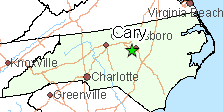 This summer’s service disruptions are coming at inopportune times, Cary residents complain. Recently, crews mistakenly cut through cables providing power, phone, and cable service, knocking out power for four hours and cutting off air conditioning on a 92 degree day.
This summer’s service disruptions are coming at inopportune times, Cary residents complain. Recently, crews mistakenly cut through cables providing power, phone, and cable service, knocking out power for four hours and cutting off air conditioning on a 92 degree day. Suddenlink is taking full advantage of a lax approach to regulatory oversight in Texas by laying its cables just about anywhere it pleases, and without talking to local officials about exactly what the cable system is doing.
Suddenlink is taking full advantage of a lax approach to regulatory oversight in Texas by laying its cables just about anywhere it pleases, and without talking to local officials about exactly what the cable system is doing.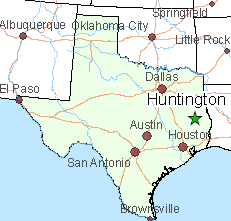 “For the most part, when they finally decided to do it they just started laying lines,” Stewart told the newspaper.
“For the most part, when they finally decided to do it they just started laying lines,” Stewart told the newspaper. After years of increasing costs for video programming, the disadvantages of not being large enough to qualify for lucrative volume discounts, and a declining customer base, a Montana cooperative says it is calling it quits on cable television service later this year to focus on its broadband business.
After years of increasing costs for video programming, the disadvantages of not being large enough to qualify for lucrative volume discounts, and a declining customer base, a Montana cooperative says it is calling it quits on cable television service later this year to focus on its broadband business.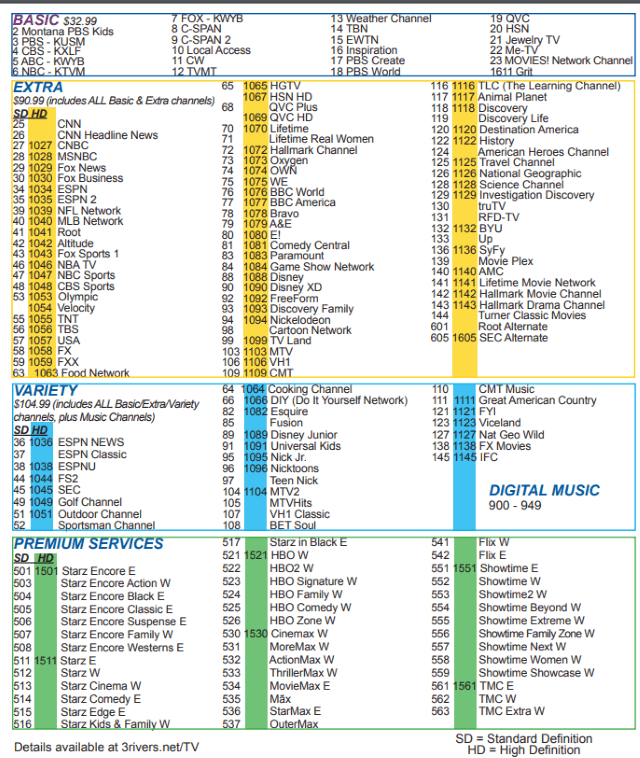
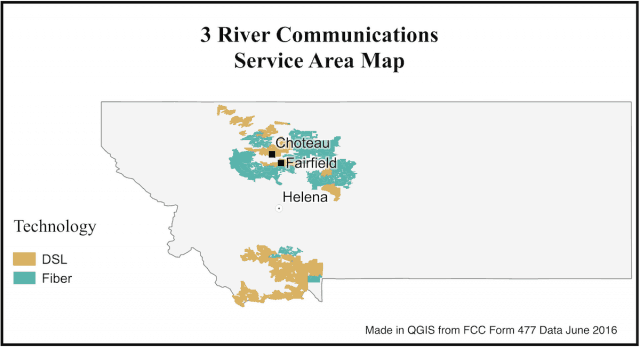 “With all the new streaming options available, [including] Netflix and Hulu and Amazon Prime, in addition to traditional satellite providers like Dish and DirecTV, we just can’t really compete anymore,” 3 Rivers marketing director Don Serido
“With all the new streaming options available, [including] Netflix and Hulu and Amazon Prime, in addition to traditional satellite providers like Dish and DirecTV, we just can’t really compete anymore,” 3 Rivers marketing director Don Serido 
